
Attention-Deficit/Hyperactivity Disorder (ADHD) is a multifaceted neurological condition characterized by a persistent pattern of inattention, hyperactivity, and impulsivity.
While conventional treatments like medication and behavioral therapy play a critical role, there’s a growing interest in natural remedies. These natural approaches, often overshadowed by pharmaceutical solutions, offer a complementary path to managing ADHD, aligning with the body’s innate processes and fostering holistic wellbeing.
Understanding ADHD and Its Impact on Life
Contrary to popular belief, ADHD isn’t just a childhood issue. It can persist into adulthood, affecting various aspects of life, including academic performance, work efficiency, and social interactions.
The disorder is not merely a deficit of attention but involves a complex interplay of genetic, neurological, and environmental factors. This complexity necessitates a multi-pronged approach to treatment, one that extends beyond conventional medicine.
The Role of Diet in ADHD Management
Diet plays a pivotal role in managing ADHD. Research suggests that certain foods and nutrients can exacerbate or alleviate ADHD symptoms.
For example, a diet high in protein and low in simple carbohydrates can improve brain function and mitigate symptoms. Foods rich in omega-3 fatty acids, like fish, nuts, and seeds, have been shown to enhance cognitive function and reduce hyperactivity.
Conversely, food additives, artificial colors, and preservatives may increase hyperactivity in some children with ADHD. A thoughtful, balanced diet can be a fundamental component of a comprehensive ADHD management plan.
Exercise: A Natural Stimulant for the ADHD Brain
Exercise is another powerful natural remedy for ADHD. Physical activity increases the brain’s dopamine, norepinephrine, and serotonin levels. These neurotransmitters play a crucial role in attention and behavior regulation.
Regular exercise can help improve concentration, decrease impulsivity, and stabilize mood, making it an essential component of ADHD management. Incorporating structured physical activities into daily routines can be particularly beneficial for individuals with ADHD.
Mindfulness and Meditation: Cultivating Attention and Awareness
Mindfulness and meditation are gaining recognition for their benefits in managing ADHD. These practices help in developing greater awareness and control over attention.
Mindfulness exercises can enhance focus, reduce impulsivity, and improve emotional regulation, key areas affected by ADHD. Regular mindfulness practice can rewire the brain to be more attentive and less reactive, offering a natural and effective strategy for managing ADHD symptoms.
Sleep Hygiene: The Cornerstone of ADHD Management
Inadequate sleep worsens ADHD symptoms, making sleep hygiene a critical aspect of management. Establishing a regular sleep routine, creating a comfortable sleep environment, and minimizing sleep disturbances are vital.
Sleep has a profound impact on cognitive functions and emotional regulation, areas often challenged in ADHD. Prioritizing good sleep hygiene can significantly improve overall symptom management.
Harnessing the Benefits of Herbal Remedies
Certain herbal remedies have shown promise in managing ADHD symptoms. Herbs like ginkgo biloba, valerian root, and lemon balm may help improve concentration and calmness.
However, it’s important to approach herbal remedies with caution, considering potential interactions with other medications and the need for proper dosing. Consulting with a healthcare professional knowledgeable in both conventional and herbal medicine is advisable when considering these options.
The Importance of a Supportive Environment
Your environment also plays a crucial role in managing ADHD. A supportive, structured environment that accommodates the unique needs of individuals with ADHD can significantly impact symptom management.
This includes organized living and working spaces, consistent routines, and understanding from family, friends, and colleagues.
Managing ADHD requires a multifaceted approach that goes beyond conventional treatments. Natural remedies like these can serve as valuable strategies in the comprehensive
management of ADHD. By embracing these natural approaches, individuals with ADHD can unlock their full potential and lead fulfilling lives.






















